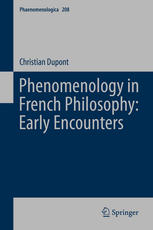

Most ebook files are in PDF format, so you can easily read them using various software such as Foxit Reader or directly on the Google Chrome browser.
Some ebook files are released by publishers in other formats such as .awz, .mobi, .epub, .fb2, etc. You may need to install specific software to read these formats on mobile/PC, such as Calibre.
Please read the tutorial at this link: https://ebookbell.com/faq
We offer FREE conversion to the popular formats you request; however, this may take some time. Therefore, right after payment, please email us, and we will try to provide the service as quickly as possible.
For some exceptional file formats or broken links (if any), please refrain from opening any disputes. Instead, email us first, and we will try to assist within a maximum of 6 hours.
EbookBell Team

0.0
0 reviewsThis work investigates the early encounters of French philosophers and religious thinkers with the phenomenological philosophy of Edmund Husserl. Following an introductory chapter addressing context and methodology, Chapter 2 argues that Henri Bergson’s insights into lived duration and intuition and Maurice Blondel’s genetic description of action functioned as essential precursors to the French reception of phenomenology. Chapter 3 details the presentations of Husserl and his followers by three successive pairs of French academic philosophers: Léon Noël and Victor Delbos, Lev Shestov and Jean Hering, and Bernard Groethuysen and Georges Gurvitch. Chapter 4 then explores the appropriation of Bergsonian and Blondelian phenomenological insights by Catholic theologians Édouard Le Roy and Pierre Rousselot. Chapter 5 examines applications and critiques of phenomenology by French religious philosophers, including Jean Hering, Joseph Maréchal, and neo-Thomists like Jacques Maritain. A concluding chapter expounds the principal finding that philosophical and theological receptions of phenomenology in France prior to 1939 proceeded independently due to differences in how Bergson and Blondel were perceived by French philosophers and religious thinkers and their respective orientations to the Cartesian and Aristotelian/Thomist intellectual traditions.